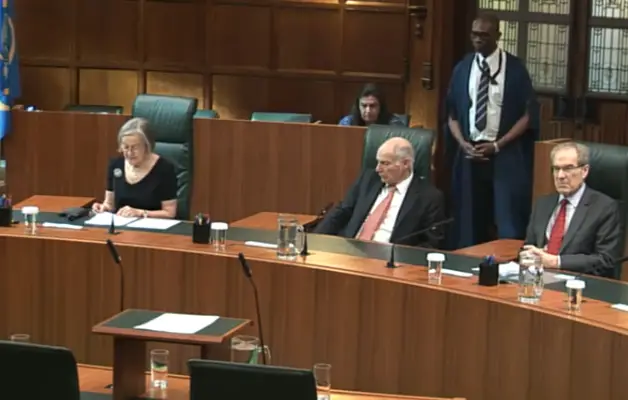Isle of Wight father Jon Platt will today (Thursday) find out how judges in the Supreme Court have ruled on the Isle of Wight council’s case against him.
Update 9.55:
The Supreme Court judges ruled in favour of the appeal and returned the case to the Isle of Wight Magistrates court .
Deputy President, Lady Hale, read the ruling (read in full),
The Supreme Court unanimously allows the Council’s appeal, declaring that the word ‘regularly’ means ‘in accordance with the rules prescribed by the school’. Lady Hale, with whom the other Justices agree, gives the only judgment.
IWC’s response
Following the ruling, the Isle of Wight council said,
“The Supreme Court has today (Thursday) delivered its judgment in relation to an Isle of Wight Council appeal seeking clarification on the issue of unauthorised school absence. The appeal was supported by and joined by the Department for Education (DfE).
“The Supreme Court’s judgment provides much needed clarity about what constitutes regular attendance at school, to schools, parents and local education authorities.
“The Isle of Wight Council will ensure it continues to apply its code of conduct in relation to school absence and in accordance with this judgment.”
Bacon: “Never supported fines as the best means to coerce attendance”
Cllr Jonathan Bacon, the former Leader of Isle of Wight Council and Independent Group spokesperson on Education said,
“As I was closely involved with this case during my time as part of the Council Administration I have been asked by a few people what my views are on the ruling issued today by the Supreme Court on school attendance.
“The case was fundamentally about seeking certainty in an area of law that was uncertain and I am glad that this has now been resolved with a clear ruling on what ‘regular attendance’ means having now been given. In handing down this ruling the Supreme Court has recognised that attendance at school is fundamental to education and also recognised the importance of attendance to a school’s ability to teach all the pupils in the classroom as well as to the education of the individual child. It would be ridiculous if the contention being advance in some quarters that parents should have the unchecked ability to remove their child from school for up to 10% of the school year had been accepted by the Court.
“In my view there are two underlying problems that remain with the current system that need to be dealt with and which were never going to be dealt with by this case, but which the Government needs to address. I have never supported fines as the best means to coerce attendance. Their existence seems to be at the core of parents concern about the current system. They may be appropriate in extreme cases but it would surely be better to have good attendance supported and encouraged by a reward based system.
“Secondly, and perhaps more easy to deal with, is the fact that a few years ago head teachers had pretty much any discretion to authorise an absence from school taken away from them. This needs to be reversed. It is plain, and I have always said, that there are situations in which it will be beneficial for a child to be able to take part in events or activities outside school but during term time. Given the ability to exercise appropriate discretion head teachers can recognise this and ensure that absences do not disrupt the education process.”
Government “set to criminalise parents”
Vix Lowthion, Green Party National education spokesperson, teacher and also like Jon Platt, a parent of three children on the Isle of Wight said,
“We all want our children to have excellence attendance in our schools – but fines and prosecution is not the best way to go. This Conservative Government are obsessed with formal, high stakes testing and believe that education can only take place in the classroom.
“Now they are set to criminalise parents for not only family holidays but one off absences such as weddings and funerals – there is no flexibility allowed whatsoever. We call upon our government to bring this policy to Parliament for debate, as is fair and right within a democracy, because for too long they have refused to have these fines up for debate.
“Instead of attacking parents’ choices, this government should be enacting legislation against holiday companies who ramp up prices in school holidays well beyond the reach of ordinary families.
“They should be seriously looking at regional, flexible term times to spread holidays across a wider variety of weeks. And they should be welcoming opportunities for our young people to get out of the confines of the classroom and learn from exciting experiences they get when away from home.”
Background
IW Magistrates and the High Court both ruled that Mr Platt had no case to answer after he refused to pay a school absence fine for taking his then-six year old daughter out of school for a family holiday. He argued she had regular attendance and the judges agreed.
DfE take to the Surpreme Court
However, despite IWC deciding they would not take the case any further, the Department for Education (DfE) ‘requested’ the IWC appeal the decision in the Supreme Court. That appeal was heard in January this year and today the judges will deliver their ruling.
Whatever the ruling is, it will have a wide-reaching impact on parents of school-age children, schools and local authorities.
Attendance problems
In November 2013 Ofsted revealed Isle of Wight school absences were the worst in the country and that Island schools were at the bottom of the league tables.
At the time, Cllr Richard Priest, the Isle of Wight Council Cabinet member responsible for children’s services said,
“High levels of absence have a direct link to poor exam performance and we must build on this good news and drive absence figures down even further.”
Academics: “Approved holidays do not lead to low attainment”
This thinking was challenged in November 2016, when Professor Alan Barr and Dr Beccy Smith appeared on national TV to reveal their analysis of DfE data on attendance. They found that approved holidays do not lead to low attainment.
Former head of Ofsted Sir Michael Wilshaw told BBC R4 this morning that he hoped the court would uphold the appeal, calling those who took their children out of school during term time ‘irresponsible parents’.
Article edits
9.55 – Ruling added
10.05 – Statement from Vix Lowthion added
11.05 – Statement from Jonathan Bacon added





